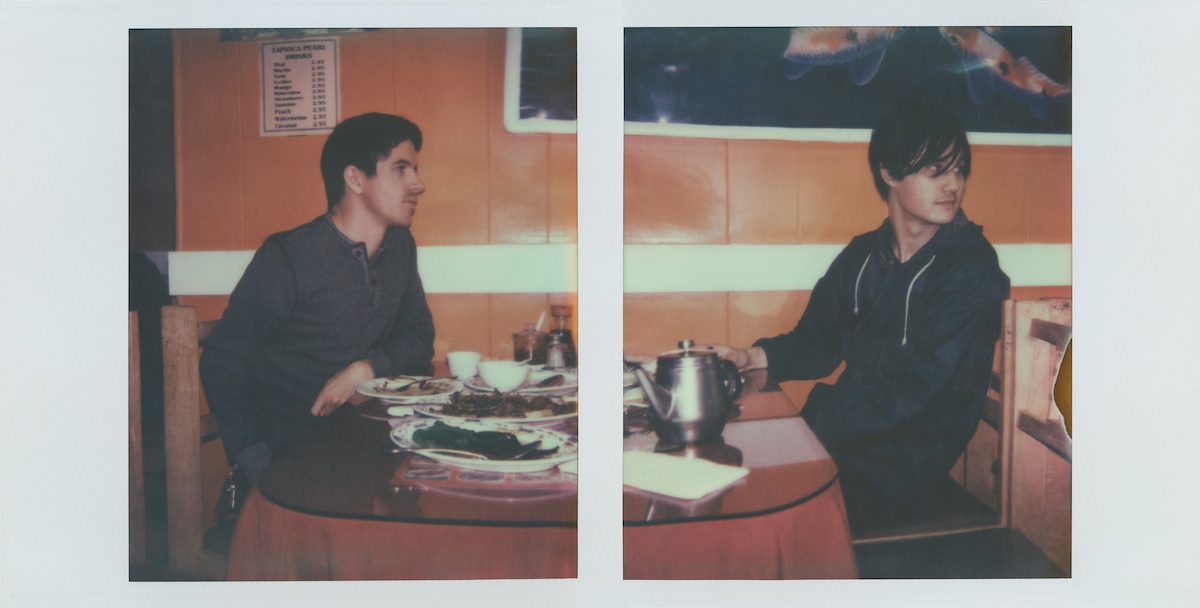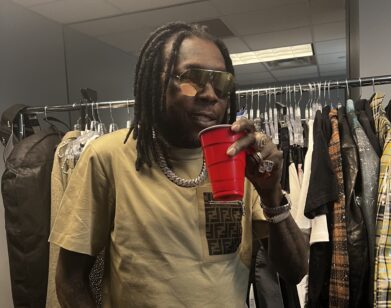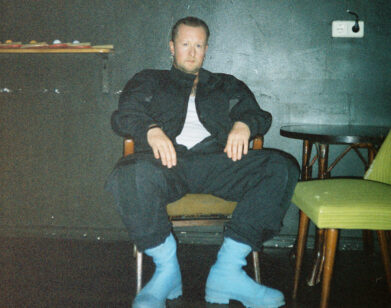The Dodos Take Flight

ABOVE: THE DODOS. IMAGE COURTESY OF CHLOE AFTEL
On the precipice of their fifth studio album’s release, The Dodos are attempting to recalibrate. In 2012, just as the folk-rock band out of San Francisco was growing from a duo into a trio, its second guitar player, Chris Reimer (formally of Women), tragically passed away, shifting the focus of the band back to its founding members. Logan Kroeber (drums) and Meric Long (guitar) have worked together as the syncopated, magnetic avant-rock band for nearly 10 years now, but Reimer’s presence had begun to feel like the tonal glue that bound their cadences into melodies.
Carrier, which releases today, breaks into unknown territory for the duo, as they confront innovation, change, and tragedy in all their interwoven forms. A decision to move labels, from Frenchkiss Records to Polyvinyl, as well as a shakeup in instrumentation, beget a fresh, more exciting—yet more plaintively aware—band whose heart continues to bleed. Long’s lyrics, as they soothe alongside his brusque fingerpicking and Kroeber’s lively drums, are grounded in introspection and empathy more now than on any Dodos record yet. (For evidence, check out “Confidence,” below.) Though this might seem like a good time for reflecting on the past, Carrier aims not to mourn, but to honor—and in its expansive electric guitar tones and ballooning bass drum, The Dodos have let themselves get carried away.
DAYNA EVANS: You just got back from your first tour in Southeast Asia. How was that experience?
LOGAN KROEBER: It was pretty amazing, but there were a lot of things that went wrong. I got crazy allergies and a really bad stomach flu, and it was a really intense schedule. We didn’t sleep more than four hours every night, since we were always traveling on planes everywhere.
EVANS: Will you go back?
MERIC LONG: I hope so. Definitely. Especially in China, people are hungry for it. I wouldn’t say they’re hungry for American bands, but I think they’re hungry for new stuff from here and from there—it’s kind of like the ’60s in America. People are just hungry for modernity.
KROEBER: Despite all of the gnarliness, it was still one of the most fun tours we’ve ever done. I’m excited to go back and have a more relaxed schedule and hopefully not get so sick.
EVANS: What do you think was making you so sick?
KROEBER: I think the stomach problems came from adventurous eating we did while we were in Taiwan. We went out to a night market there and we ate congealed pigs’ blood on a stick and weird oyster omelet things and a bunch of other stuff that night, and I think that’s where my troubles began.
EVANS: How are you preparing for your upcoming U.S./Europe tour? It’s a long one.
KROEBER: I’m trying not to think about it. It’s not that I’m not excited, but I tend to overthink things. As soon as you get outside of the city limits, you’re stuck with the bag you packed and I hate the feeling that I have leading up to departure when I’m double-triple-checking things. I get a little too much nervous energy.
EVANS: Do you think playing these new songs will fuel the anxiety?
KROEBER: It can. There is a certain demand on some of the new songs.
LONG: We’re bringing out a third member with us on this tour, and he’s a real multitasker kind of dude, so I’m really excited because he’ll be singing with me on a lot of songs, which is a first. There are a lot of harmonies that I never would have been able to pull off by myself, so we’re going to work on that, and that’ll be a new, fun aspect of the show.
EVANS: Will it take a lot of reconfiguring to play the new songs live?
KROEBER: I really don’t know. It could be fairly straightforward to just play what’s on the record, and the new guy will just figure it out quick. We might have to rearrange some stuff. There’s a lot of looping that Meric does on his guitar and we’ll have to ask ourselves, “Do we give the looping part to the new guy? Or do we keep the loop and he can do something on top of it?” It’s a trip, because we recorded Carrier and now we’ve just recorded a new record, and we don’t know what’s going to happen to it. We’ve moved on to these other songs and now we’ve got to go back to the stuff that’s just come out. There’s just a lot of material. [laughs]
EVANS: You’re putting out Carrier on Polyvinyl—what was the impetus for that switch?
LONG: There were a lot of changes. After No Color and after Chris passing away and stuff happening with our lives, my whole approach to songwriting became about trying to find new inspiration or a new approach to things. Working with new people was a part of that. It wasn’t necessarily that the machine was broken, but it was more that we needed a new change and new energy. We recorded in a new studio with new people that we’d never worked with before. We wanted to put ourselves out of our comfort zone and see what happened.
KROEBER: I was definitely coming from some new/old approaches, because I incorporated more of a standard drum kit into the songs for the first time, you know, with a hi-hat and a bass drum. Though that is probably the oldest thing on earth for most drummers, for me it was new, because for a long time, I didn’t have those things. Trying to find unique, interesting beats in a basic drum kit format was pretty challenging because when you have that setup, it’s hard not to fall back on more standard rock-‘n’-roll beats, which is not what we wanted to do.
EVANS: Was the songwriting process any different in putting together the new record?
LONG: Yeah, absolutely. There are lots of things that are different. For me, I needed to find a new angle. The songwriting part of that was really integral to this record. That was almost more important than making a good record. It was more important that I felt like I was writing from a different place, than I was writing good songs. There were all sorts of little things I had to do to try to trick myself, like I came home after tour and I spent a lot more time just working on the songs before taking them into a band setting and I did a lot more time recording and working with words instead of music. All these things trick your brain into thinking in a different way. I feel like whatever steps I took to recalibrate my songwriting approach, they sort of extended the life of my enthusiasm for the band. It feels a little fresher.
EVANS: It feels very fresh. There’s more confidence here.
LONG: I don’t feel more confident necessarily, but I feel more determined about what’s important. It’s easy for myself to get caught up in what expectations are and what we’re supposed to be as a band, and at a certain point, maybe it’s with age, your vision kind of focuses, and you come to learn what is real and what is important. There’s a lot more determination.
EVANS: 2012 was a rough year for the band, with Chris’s passing. Could you speak to how Chris has influenced your songwriting?
KROEBER: I see Carrier as pure determination on our part to continue playing and to honor Chris’s spirit. I don’t know if anybody else is going to look at it with the same emotional lens as I do. And now this new one that we just recorded, it is representative of a lightness we felt after the perseverance we endured to make Carrier. But I don’t want to cloud anyone’s perception. I’ve had other people come up and say, “Oh this is the happiest record,” and, “It’s so fun!” but that’s what it represents to me right now.
LONG: Chris was a huge influence when we were touring together. When he joined the band, I was already looking for a new approach and I was trying to break my old habits. A lot of the stuff that Chris did—even outside of Women, like with his solo stuff—he was so textural and he would get these tones out of his guitar that I was looking for, and he’d figured out how to do it. We’d go to guitar shops on our days off and geek out on pedals. When it came time, when we were going to start recording and writing this record, I had talked to Chris about collaborating because we sort of have an opposite approach to guitar. I have this aggressive fingerpicking thing, and he had this textured wall of sound, and we were stoked on the idea of seeing what happened when those two things came together. He passed away suddenly, so we never got to find out. In writing for the record, I didn’t want to try to intentionally focus on representing Chris, but he had already left his mark and he already had pointed me in a direction. I couldn’t help it. He’s all over the record—in the songs and in the guitar tones. He was somebody I really respected, as well. When I was writing parts or even playing live, I’d be like, “Ah, fuck, I hope he likes this.” He has that place in my mind. I think when somebody occupies that space, it can influence you quite a bit.
CARRIER IS OUT TODAY (POLYVINYL RECORDS). FOR MORE ON THE DODOS, PLEASE VISIT THE BAND’S WEBSITE.






